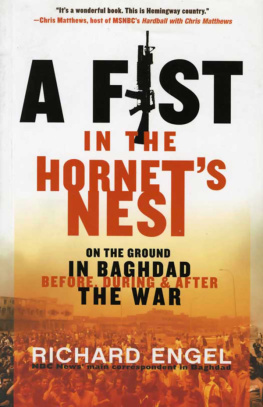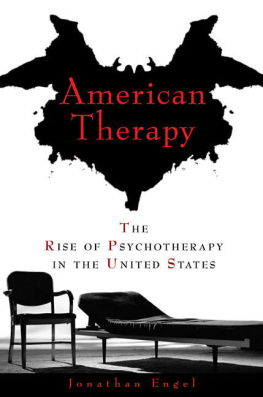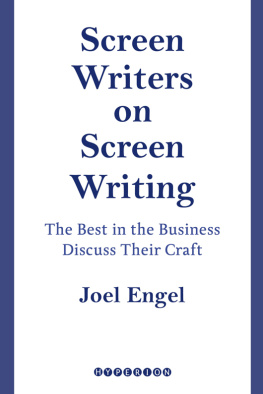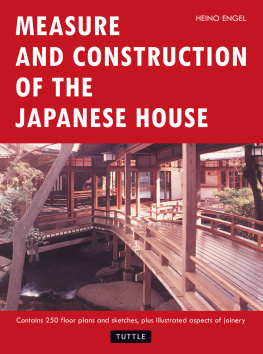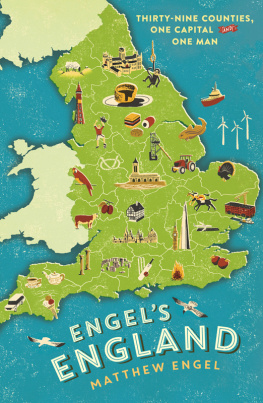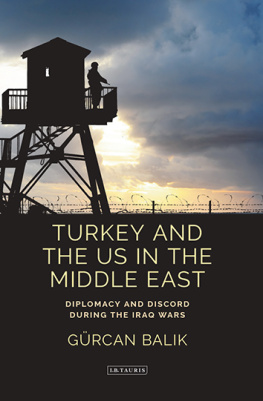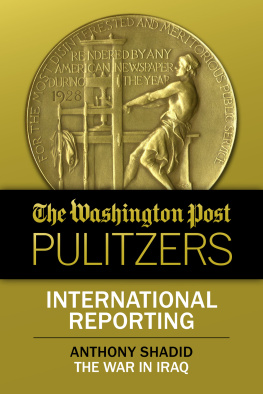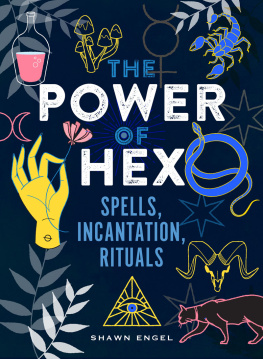
For my parents, Nina and Peter
T HE TANK SHELL THAT SMASHED into the Palestine Hotel sent bits of concrete pouring down onto the roof of a tent, where Id been sitting, urgently discussing with my friend Ismail how we could stay safe on this, the heaviest day of the fighting wed seen in Baghdad.
Weve been hit, I thought when I heard the explosion above me. It was so loud that I instinctively bent over and covered my head with my hands. I had no idea who had fired on us, or with what. More important, I didnt know if there was more of it on the way.
I ran out of the tent onto the grassy lawn in the shadow of the Palestine, craning my neck to see what had slammed into the upper floors of the hotel. I struggled to snap on my black helmet as I ran to record what was going on around me with my handheld digital video (DV) camera. The video was very shaky. I was breathing hard.
When I first saw the destruction, I was sure it had been caused by a relatively small weapon, perhaps a rocket-propelled grenade. The explosive had hit the tower of the hotel where the guest rooms were located. The Palestine consisted of a large rectangular base, which housed the lobby, the restaurant, a coffee shop, several conference rooms and a boutique that sold Iraqi souvenirs, including Bedouin clothing, checkered headscarves and stuffed camels. The eighteen-story tower grew out of the middle of the base. The tank shell had shorn off the corner of the towers fourteenth and fifteenth floors. The damage also appeared to have been made by something fired from the ground and not by the many fighter jets and helicopters that had been ferociously attacking Baghdad all morning. I noted these observations in my head as I ran around the hotel holding my little DV cameramy flak jacket thumping against me with each stride and my helmet slipping off my headtrying to figure out if the time had finally come to flee the hotel for one of the safe houses I had established.
From where I stood staring up at the building, I could hear a female journalist screaming in panic. She was one floor above me, standing on the roof over the hotels lobby and conference rooms. It was effectively a balcony where most of the broadcast journalists did our transmissions. She was yelling, Were all going to die! Were all going to die! Shed snapped. The strike on the Palestine was the critical moment of what had already been a harrowing day.
Id woken that morning to the sound of US fighter jets tearing through the sky over the hotel. It sounded like a giant zipper. The jets were buzzing so low that the glass balcony door in my room trembled like the top of a snare drum. I rolled out of my bed, belly to the floor, and inched over to the balcony, where I watched the jets swoop over Baghdad like birds of prey, releasing bombs from their talons. I saw those bombs crumple the buildings they hit, turning the concrete and glass structures into what looked like heaps of freshly tilled topsoil out of which sprouted mushroom clouds of pure white smoke.
A journalist had already been killed that day in Baghdad. American forces had destroyed the office of the Arab television network al-Jazeera in the early-morning hours, killing a reporter. Al-Jazeeras officealong with the bureau of the rival Arabic-language satellite television network Abu Dhabiwas across the Tigris River from the Palestine in a much more dangerous part of the city. Thus far, Baghdads western bank had been attacked by US forces every day of the war. It was clearly the best place in the city to take picturessome of the images the two Arab networks broadcast were nothing less than extraordinarybut the location was far too risky. They were killing themselves to compete with each other. Id offered the Abu Dhabi team a chance to stay with me at the Palestine. I told them that I thought the two networks had been pushing their luck too far throughout the war. Youre too close, I said.
This is not to justify what happened. Ive been told that both al-Jazeera and Abu Dhabi had given the Pentagon the global positioning system (GPS) coordinates of their bureaus in Baghdad. The Americans, therefore, should have known where they were. The US militarys attitude, however, was that anyone who wasnt embedded with them was in Iraq at his or her own risk.
That dayApril 8, 2003I also witnessed what was for me the most terrifying air attack carried out by what I suspect may be the most frightening plane in the US arsenal: the A-10 Thunderbolt II, more commonly called the A-10 Warthog because of its stubby, inelegant shape and the grunting noise it makes when it fires its anti-tank machine gun. From my balcony Id watched the stocky little plane fly low and slow over the city, dropping rows of flares to divert heat-seeking anti-aircraft rockets fired at it; none were. The pilot also performed acrobatics to protect the plane, swooping up and down and from side to side as if in an air show. The A-10 Warthog is armed with a Gatling gun in its nose that fires huge 30mm bullets hardened with depleted uranium that penetrate tank armor. The spinning gun fires bullets so quickly that its impossible to distinguish the sound of the individual shots, and the rapid firing blends together to make a low-pitch grinding sound like an upstairs neighbor dragging a heavy sofa across the floor. I watched the plane unleash its Gatling gun on the Iraqi ministry of planning, which like all ministries at this stage in the war was empty. The barrage of bullets made it look as if someone were cutting the ministry in half with a giant chain saw. I wondered at the time why a plane designed to destroy tanks was firing on an empty building. I cynically suspected the pilot of testing out the Warthogs capabilities, letting her rip, so to speak.
The Warthog wasnt the only American hunter prowling the sky and providing close air support to the advancing troops that day. I also watched a pair of US attack helicopters in action a few miles to the south of the Palestine. Id filmed them circling each other like bees over a flower, their noses pointing down toward the streets. They were occasionally firing into the city, destroying anyone and anything that threatened the tanks and armored personnel carriers (APCs) filled with marines advancing below them.
Throughout the day, Id heard gunfire crackling around the hotel and Iraqi artillery being launched from behind a row of nearby buildings. The artillery shells had been whizzing overhead on their way to the western bank, where the US Army had taken up position one day earlier. I suspected many of the artillery shells were probably landing on Iraqi homes in the area.
Earlier, Id still had the feeling that the Palestine was in the calm eye of the hurricane, albeit an eye that was shrinking by the minute. That changed when the hotel itself was shelled.
I rushed back to the tent to see what Ismail thought about the attack on the Palestine. Ismaila stocky Turk in his forties with a crew cut, a thick neck and round sensitive eyeswas in charge of the Turkish satellite uplink service Id been using for my live shots, a company called IHA. The tent we were in was IHAs makeshift office, equipped with a television set, a satellite telephone, a bed, a small refrigerator and an area with a carpet for Ismail and his team of five cameramen and satellite-uplink engineers to pray; they were all Muslims. All of his equipment was powered by several generators that Ismail had rigged with auxiliary gas tanks so they could run twenty-four hours a day. Ismail had once been an officer in the Turkish military and still acted the part. He was firm, always spoke his mind and thought of his team before himself. His crew ate together and relied on Ismail to settle all disputes. If the team had only three pieces of bread, they were given to Ismail to divide equally.
Next page
